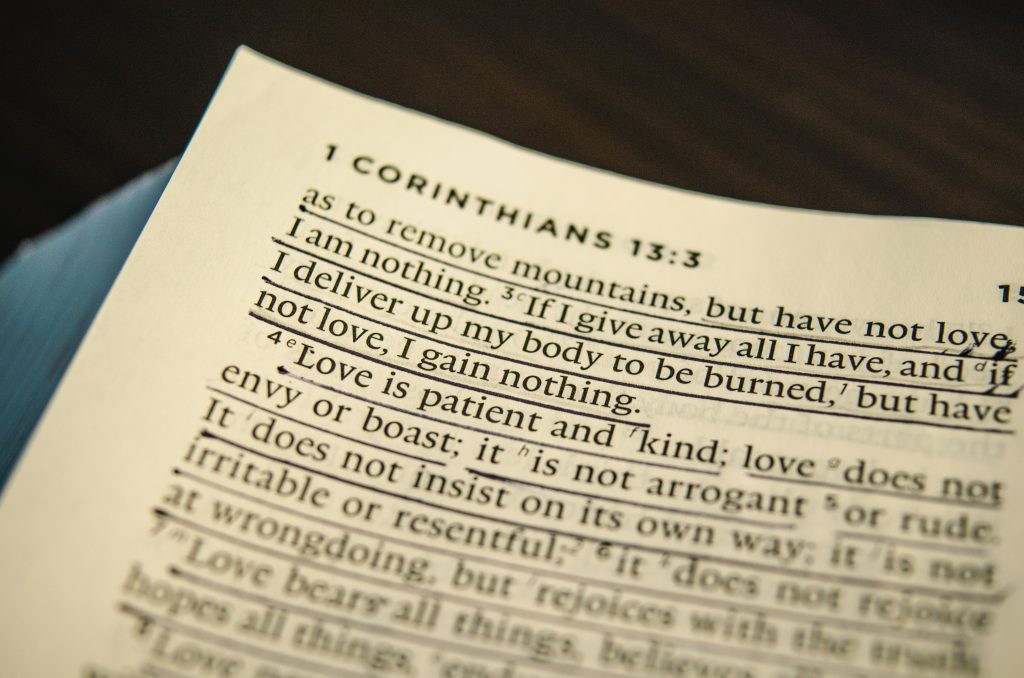This is Part 3 of a 3-part blog post.
Read Part 1: Why Does Commitment Matter in Marriage?
Read Part 2: Personal Commitment in Marriage and a Personal Worldview
As I explained definitions of moral commitment in the previous blog, moral commitment in marriage refers to “the sense that one is morally obligated to continue a relationship.” Johnson (1999) has argued that moral commitment is affected by three components: a belief in the value of consistency in the marriage, values regarding the stability of a particular type of marriage, and the sense of obligation to one’s partner. Moral commitment provided a sound explanation of relationship stability. Researchers found that moral commitment has connections with relationship maintenance behaviors in a sample of married individuals. Ramirez (2008) reported that moral commitment is positively associated with relational maintenance behaviors as a means of maintaining marital relationships, including assurances of a marital future, including important friends and family, expressing attraction to the spouse, a positive approach to the relationship, and acceptance of household responsibilities. Ramirez explained that individuals’ relational maintenance behaviors increased their spouse’s sense of moral obligation because the spouses perceived the expressed relational maintenance behaviors as the desire to continue the relationship. Researchers also found that commitment to marriage was positively associated with moral standards, religiosity, and church attendance, while it was negatively associated with the number of times married. This result showed that this dimension of commitment reflected moral conduct and personal integrity based on a sense of right and wrong.

Religion and spirituality are important parts of marriage, and they strengthen marital commitment. Several studies showed the existence of a relationship between spirituality/religion and the quality of marriage. Religious orientation provides the prime motivation for marital commitment. Religious devotion and spirituality reinforce the moral aspect of commitment by providing the value that is placed on the marital bond and spiritual support. Mahoney and others (2008) reviewed 94 studies on religiosity and marital functioning. Their review reported that greater individual religiousness is related to greater commitment to marriage.
Including God in the marriage enhances married individuals’ belief that the institution of marriage should not be broken by divorce. Religious married individuals believe that since the husband and wife are united with God in a threefold cord, God is displeased with breaking this cord through a divorce. Accordingly, in order to avoid the displeasure of God, these married individuals are motivated to remain in the marriage. The belief that their partner would not consider divorce gives them a sense of peace and security and an increased desire to work through the problems in their marriage. Conversely, commitment to the institution of marriage works as a barrier to divorce, even when married individuals’ marital quality is not high. When the religious community in which married individuals are involved forbids or strongly discourages divorce, married individuals who seek a divorce feel concerned about disincentives from their religious community.

Photo by Jackson David on Unsplash
Religiosity also provides a sacred calling and purpose for committing to marriage. The belief that God is included in marriage offers the perspective and sacred purpose needed to remain committed. In his sacred calling, a husband and wife find meaning in their commitment to marriage. Finding meaning in commitment to marriage as a sacred calling gives married individuals a desire for relationship permanence, which helps married individuals work through difficulties rather than an unpleasant obligation. Waite and Joyner (2001) argued that marital commitment was strongest when married individuals had a clear sense of the future together. Since religiosity provides married individuals with a sacred meaning for relationship permanence, they perceive increased benefits to staying together.
Moral commitment in the Bible
Marriage as a permanent covenant is not merely a human agreement between two consenting individuals but a sacred bond between a man and a woman entered before and under God as a witness. Malachi 2:14 describes the marriage agreement between the woman and her husband before God: “Because the LORD has been a witness between you and the wife of your youth, against whom you have dealt treacherously, though she is your companion and your wife by covenant.” The Hebrew word for “companion” is haberet, which refers to “friend, partner” or a closer relationship involving a covenant. Malachi spoke against Jewish men who were divorcing their wives for the purpose of entering advantageous marriages with pagan women who worshipped other gods. Malachi indicated that divorce was a violation of the marriage covenant because one’s wife was a spiritual companion who had come into association with a covenant. Since the Lord had acted as a witness to these marriage covenants, Jewish men’s behaviors were an affront to God. Accordingly, divorce is not part of the Creator’s perfect design. It is to be prohibited since it breaks a unique and holy union.

Photo by Nathan Dumlao on Unsplash
In Matthew 19, Jesus cites Genesis as the foundation for understanding marriage. When the Pharisees questioned Jesus about divorce saying, “Is it lawful for a man to divorce his wife for any reason at all?” Jesus replied to them by quoting from Genesis 2:24: “Have you not read that … a man … be joined to his wife, and the two shall become one flesh? So they are no longer two, but one flesh. What therefore God has joined together, let no man separate” (Matt 19:4-6). In Moses’ day, permission for divorce was a temporary concession made due to the fallen nature of humanity. However, Jesus indicated that God’s original design for marriage was permanent and that the hardness of the heart itself should not be a legitimate excuse for divorce. Jesus’ teaching shows the truth that marriage is more than a contract for the convenience of the two parties. Since marriage is a unique and holy union, divorce is not in accord with the Creator’s perfect design.
Consequently, the belief that God is part of their marriage as a third cord gives married individuals the strength to remain committed. It includes that God “brought them together,” and their wedding vow is a covenant with God. Since they perceive the relationship with God as the center of their marriage, commitment to marriage is an outcome of commitment to God. They are motivated to be committed to their marriage.

References
Johnson, M. P., Caughlin, J. P., & Huston, T. L. (1999). The Tripartite nature of marital commitment: personal, moral, and structural reasons to stay married. Journal of Marriage & Family, 61(1), 160-177.
Johnson, M. P., Caughlin, J. P., & Huston, T. L. (1999). The Tripartite nature of marital commitment: personal, moral, and structural reasons to stay married. Journal of Marriage & Family, 61(1), 160-177.
Ramirez Jr, A. (2008). An examination of the tripartite approach to commitment: An Actor-Partner Interdependence Model Analysis of the effect of relational maintenance behavior. Journal of Social & Personal Relationships, 25(6), 943-965.
Waite, L. J., & Joyner, K. (2001). Emotional Satisfaction and Physical Pleasure in Sexual Unions: Time Horizon, Sexual Behavior, and Sexual Exclusivity. Journal of Marriage & Family, 63(1), 247-264.







 This past spring,
This past spring,  Perhaps you have an interest in how your academic pursuits and community interests might align. If so, I’d encourage you to find out more about The Legacy Project or other
Perhaps you have an interest in how your academic pursuits and community interests might align. If so, I’d encourage you to find out more about The Legacy Project or other  Dr. Jacqueline N. Gustafson
Dr. Jacqueline N. Gustafson